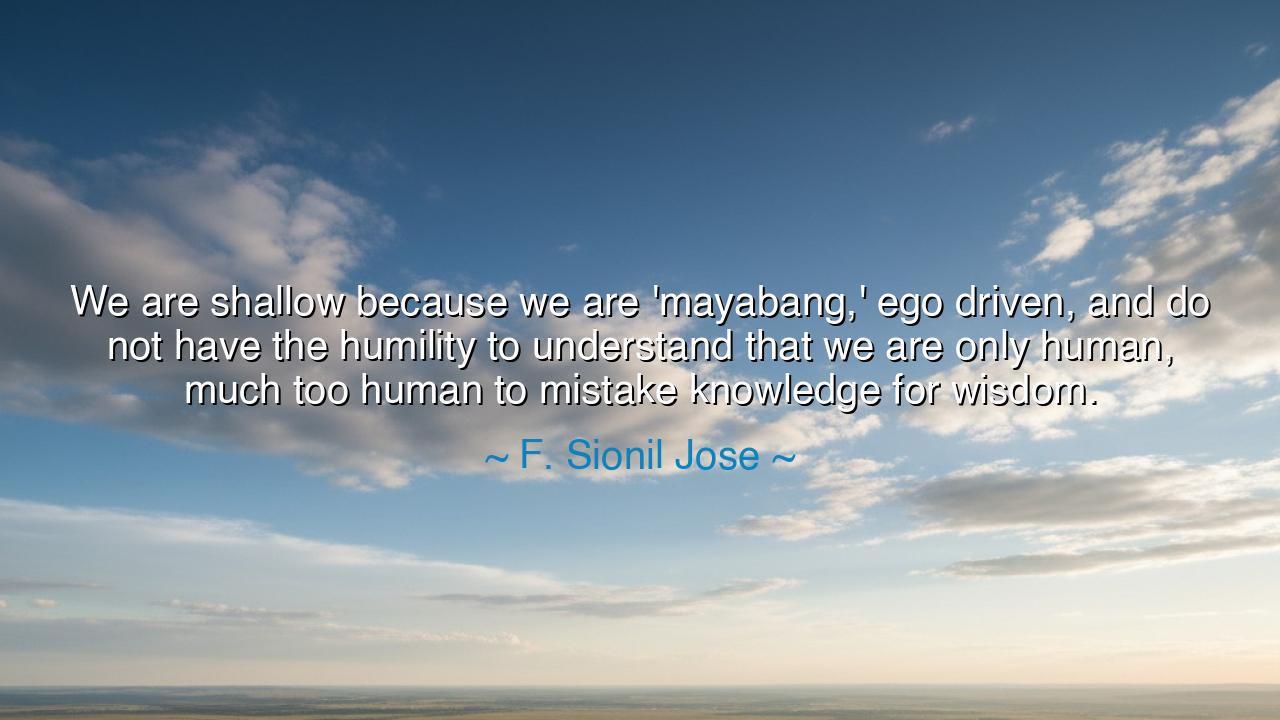
We are shallow because we are 'mayabang,' ego driven, and do not
We are shallow because we are 'mayabang,' ego driven, and do not have the humility to understand that we are only human, much too human to mistake knowledge for wisdom.






In the fierce and unflinching words of F. Sionil Jose, one of the greatest literary minds of the Philippines, lies a timeless rebuke and a call to awakening: “We are shallow because we are 'mayabang,' ego driven, and do not have the humility to understand that we are only human, much too human to mistake knowledge for wisdom.” These words are not mere criticism — they are a mirror held up to the soul of mankind. They speak of the ancient battle between pride and understanding, between the noise of intellect and the silence of wisdom. Jose reminds us that the greatest enemy of depth is not ignorance, but arrogance — the belief that knowing much is the same as being wise.
The origin of this thought springs from Jose’s lifelong reflection on Filipino society — yet it transcends nation and age. He witnessed a world rich in talent but poor in humility, where people mistook education for enlightenment, and status for virtue. The word “mayabang,” meaning prideful or boastful, carries the weight of moral warning. It is the kind of pride that blinds the eyes and deafens the heart. It is the pride that makes a man parade his intellect before others while forgetting that wisdom begins in humility. To be “too human,” as Jose writes, is to fall into that ancient trap — to let ego build a wall between the mind and the spirit.
For what is knowledge, if not a tool that can both build and destroy? A man may master the sciences and the arts, yet remain a stranger to kindness, justice, or truth. The libraries of the proud are vast but cold; the words of the humble are few but full of light. Knowledge fills the mind, but wisdom fills the soul. The difference lies in understanding one’s own limits — that no amount of learning can make man divine, and no greatness of intellect can excuse the poverty of compassion. When we mistake knowledge for wisdom, we create a world where reason is sharp, but conscience dull.
Consider the story of Socrates, the philosopher of Athens, who was declared the wisest of men not because he knew all things, but because he admitted that he knew nothing. His humility was his crown. While others boasted of their knowledge, Socrates questioned, listened, and reflected — for he understood that truth reveals itself not to the proud, but to the patient. His death, chosen over the betrayal of his principles, stands as a monument to the power of humility. In his example, we see the antidote to the shallowness Jose condemns: the courage to doubt oneself, to keep learning, and to never let the mind grow louder than the heart.
Ego, when left unchecked, makes men shallow because it builds palaces of illusion. It teaches us to speak before listening, to judge before understanding, and to display before serving. The ego whispers, “I know enough,” and in that moment, growth dies. Societies, too, crumble when they are led by ego-driven minds — for leaders who cannot bow before truth will bend the truth to bow before them. Jose’s words echo as both a warning and a lament: that nations fall not because of ignorance alone, but because of the arrogance that silences wisdom’s voice.
Yet this truth is not a condemnation; it is a call to renewal. To cast away shallowness, we must reclaim humility — not the humility of weakness, but of strength: the humility to listen, to admit fault, to learn from even the smallest of teachers. Wisdom begins where pride ends. The wise man does not boast of what he knows; he seeks to understand what he has yet to learn. The wise nation does not exalt itself above others; it works quietly, steadily, and justly, knowing that greatness is not declared — it is lived.
So, my child of thought, remember the lesson that Jose leaves behind: never mistake the glitter of knowledge for the light of wisdom. Knowledge may win applause, but only wisdom wins peace. Cultivate depth by nurturing humility. Let your learning lead you not to vanity, but to service. Be mindful that every truth you discover is but a fragment of the infinite, and that to truly know is to forever seek.
For in the end, as the ancients taught, the proud fall from the heights of their own making, but the humble rise on the wings of wisdom. To be wise is not to know everything, but to know oneself — and to bow before the mystery of life with reverence, gratitude, and grace.






AAdministratorAdministrator
Welcome, honored guests. Please leave a comment, we will respond soon